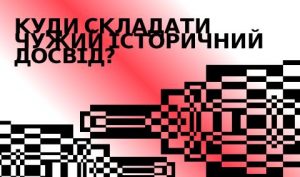Where to Put an Alien Historical Experience?
“The past is not dead. It’s not even past”, William Faulkner wrote.
The creative work of all four writers presented in the program Where to Put an Alien Historical Experience? are combined by the desire to get across little-known or local moments of the past to the future and today’s reader. Everything written in the authors’ books is at the same time familiar and unfamiliar to the Ukrainian reader. The language conflict, its political utilization and consequences for people who live in the middle of this conflict — it’s all about modern Ukraine and for a wonder it’s all about Northern Italy or part of the South Tyrol, which is a
German-speaking region that was detached from Austria a century ago and became an Italian province. The issues of language and identity have appeared many times in different countries and will arise again and again. How was it solved by others? How we will solve it? All this, but not only this is told in the novel by the famous Italian writer Francesca Melandri Eva Sleeps.
Dan Lungu — one of the most famous Romanian writers, the author of the novel Sînt o babă comunistă! (I Am an Old Communist Hag) — returns to the topic of nostalgia for the Ceausescu’s dictatorship. Is it true that people are nostalgic about that past, or just about their youth? Is it funny or rather sad? What the future generations of Romanians and Ukrainians will be nostalgic about?
Meir Shalev — a famous Israeli writer, the author of the novel My Russian Grandmother and her American Vacuum Cleaner — tells a true story about his ancestors who arrived at 1948 to create the State of Israel. This novel is the novel-antipode to Sholokhov’s Podnyataya Tselina (Virgin Soil Upturned), but nobody neither tells nor writes about that. This is a novel about the transformation of desert into a garden, the creation of new world, new life, about the transformation of the Soviet people into the citizens of a new state. There are a lot of humor in it, a lot of life’s truth, and many questions everyone gives his or her own answer to.
Norman Ohler — a German novelist, screenwriter and journalist — has recently surprised the literary world with his book High Hitler, in which he tells about little-known side of the Second World War: about the search, production and consequences of the drug consumption that would have led to the ‘great victory’ of German fascism. He tells about drugs for soldiers and army officers, about Hitler and his personal doctor Theodor Morell. Also, it’s about why professional historians don’t pay attention to non-historical reasons of these or those events. This book has attracted attention of politicians and historians. It has made a great many of people look back on their past and cast another view on it.
Let’s try to look on the past in a different way, too: on our own past and someone else’s.

